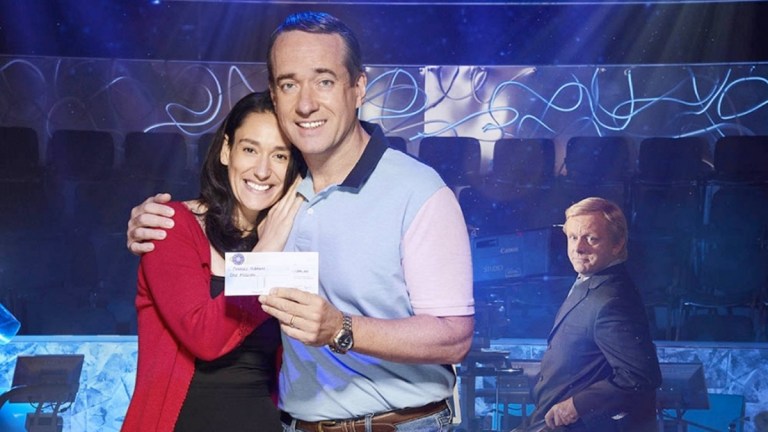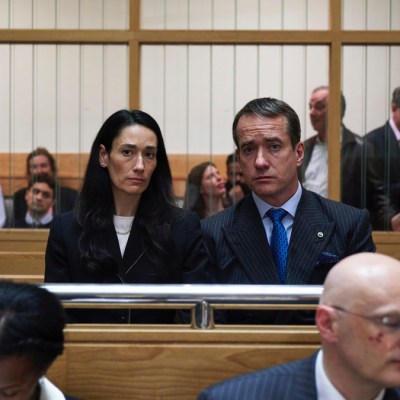Quiz Episode 3 Review
The jurors reach a verdict in the final part of ITV’s lavishly entertaining Quiz, and it’s time for us to do the same. So, guilty or not guilty?

This Quiz review contains spoilers.
Quiz might be set in the early 2000s, with all the bootcut jeans, Sugababes and Sir Trevor Macdonald that entails, but it’s a drama about now. Not now-now, but the last existential crisis before this one – or maybe two ago, before climate catastrophe and Coronavirus – the one about the truth.
When James Graham’s play was being written, one consequence of the reality TV boom, fact-adjacent Facebook ads and interbreeding in the worlds of advertising, celebrity and politics was moving its furniture into the White House. The UK had watched a referendum campaign fought by mostly shrugs on one side and custom bus decals on the other. People were sick of experts. News was fake. It was the post-truth era.
That’s the context for episode three, which is mired in the trickiness of facts vs lies. ‘The bottom’s falling out of the truth market, Mr Smith’ professional quiz show exploiter Paddy Spooner tells the Celador boss, making use of the periscope-to-the-future period drama writers often allot to their characters. ‘Say something loud enough, long enough, maybe it becomes de facto truth’ Ingram’s Lieutenant Colonel says in a discussion about Iraq. ‘It’s all about perception, Diana’ says Charles after their first police interview. There’s talk of ‘the narrative’ and justice ‘being seen to be done’. Sonia Woodley QC (Helen McCrory) implores the jury to stick to the truth and resist ‘entertaining falsehood’.
Entertaining falsehood being very much television’s stock in trade, it proves hard to resist, and even harder to separate from fact. The courtroom scenes show that Woodley was spot-on with her description of a new state of play – ‘justice as entertainment’. Even ITV’s head of entertainment Claudia Rosencrantz (Aisling Bea) treats the trial like a Rumpole of the Bailey marathon. (‘God, I love a good ITV courtroom drama.’)
Which it basically is, for everybody except the defendants, whose lives steadily unravel in front of us. The Ingrams are targeted by jokey abuse at home, at work, at their daughters’ school, even in breaks from the courtroom. If Quiz proves anything definitively it’s that the world and his wife labours under the misapprehension that they’re a comedian.
Read more
Quiz’s final instalment sloughs off some of its comedy in favour of drama and the result isn’t a total success. Watching the Ingrams endure public censure and earnestly declare their love for each other is less entertaining than the heist stories of episodes one and two.
Much more fun are the flashbacks to Charles Ingram’s Rocky-like preparations for his appearance in the hot seat (including a recap of Craig David’s calendar-based wooing routine that would be criminal not to include on Matthew Macfadyen’s comedy showreel from now on) and a fantasy song-and-dance sequence that is the unarguable highlight. (Just when you thought it couldn’t get any more enjoyable, in walks Chris Tarrant in a top hat and cane. Bliss.)
Other high points include Helen McCrory as Woodley, fluently dismantling the case for the prosecution with a series of monologues on the unreliability of memory. Her lecture on the construction of a narrative through editing felt like another intervention from the future, where reality and ‘scripted reality’ television blur the lines between real life and fiction, inspiring the exchange of privacy for notoriety, of personhood for the dubious privilege of being a contestant.
Ingram’s explanation of his behaviour in the hot seat (‘I just tried to be entertaining’) and Diana’s ‘chair-wise’ coaching were another precursor to our time, when being a colourful character is all it takes to open doors, up to and including that of the Oval Office.
In the end, the argument for the defence wasn’t enough. Woodley lost her case, and the Ingrams lost their privacy and reputations, but not each other. Doubt was cast on certainties, sureties were dislodged and narrators were proved unreliable.
So, did they do it? What’s the truth of the matter?
Having presented both sides of the story, Quiz remains coy on its own verdict, leaving us to argue it out in our living rooms. The point must be that in this new state of play, there can be any number of versions of the truth. That’s the world we’ve built for ourselves.


